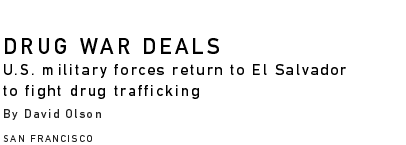
|

|

|

|
| |
|
|
|
Although El Salvador's civil war ended eight years ago, the U.S. military again is increasing its presence in the small Central American country. In July, the Salvadoran legislature approved a U.S. request for a drug-surveillance operation carried out by the U.S. military. The FMLN--the guerrilla movement in El Salvador's civil war and now the largest party in the Salvadoran legislature--strongly opposed the agreement, and tried unsuccessfully to convince the Salvadoran Supreme Court to block it. Opponents of the operation cited the symbolism of stationing U.S. troops in a country that suffered through a 12-year civil war fueled by U.S. support for a right-wing government that committed human-rights atrocities. "It's very sad that the civil war ends, and such a short time later, the best we can do is to set up another military base when the country is still trying to rebuild from the war," says John Lindsay-Poland, director of the Task Force on Latin America and the Caribbean for the Fellowship of Reconciliation. The agreement with the Salvadoran government limits the U.S. presence to 15 military personnel and aircraft that are based in the United States but are stationed in El Salvador temporarily--usually for about six months, says Stephen Lucas, spokesman for the U.S. military's Southern Command, based in Miami. The operation is run out of a Salvadoran military base at Comalapa International Airport near San Salvador, which also functions as the country's principal civilian airport. U.S. flights have already begun.
|

